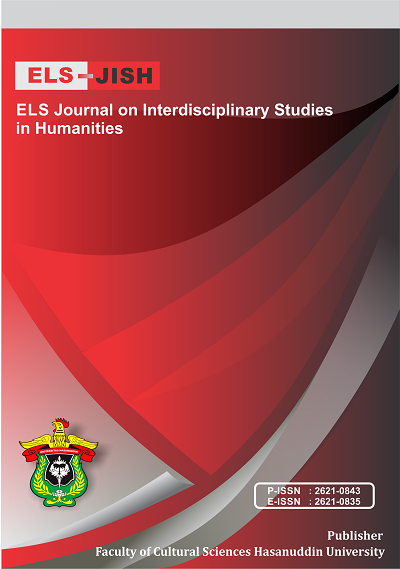Blogging to Write: Promoting Learner Independence in a 4.0 Learning Environment during the pandemic Covid-19
DOI:
https://doi.org/10.34050/elsjish.v5i3.23277Keywords:
Blogging, Covid 19 Pandemic, Promoting Learner Independence, 4.0 Learning EnvironmentAbstract
The goal of this action research project is to investigate how a blog writing project may help university students become autonomous language learners especially in the 4.0 learning environment.. This research also aims to determine the value of using a blog to help students improve their writing skills. Questionnaires and interviews were used to collect data at the end of the term. At this point, students were invited to consider their feeling and perceptions regarding the blog, as well as how it helped them practice writing outside of class, especially in the situation of pandemic Covid-19 nowadays. The study found that students' reported benefits of utilizing blogs included increased interest and motivation to use English as a result of interaction with, and feedback from, classmates and teachers. This can tell that they have already become autonomous learners.
The preliminary findings also suggest that learners who participated in the blog project were interested in continuing to blog even after the semester finished. Further research needs to focus on whether or not learners did continue using this resource after the course ended.
References
Andini, C. (2021). The Use of Honorifics in English and Buginese with special Reference to Bone Language: A Comparative Study. International Journal of Innovative Science and Research Technology, 6(7), 873-877.
Auth, C’., Allen, C., Blattner, A., Bergstrom, D., Brazier, M., Bost, M., & Mistry, K. (2012). A 22nm High Performance and Low-Power CMOS Technology Featuring Fully-Depleted Tri-Gate Transistors, Self-Aligned Contacts And High Density MIM Capacitors. In 2012 Symposium On VLSI Technology (VLSIT) (Pp. 131-132). IEEE.
Bruner, J. S. (1966). Toward A Theory of Instruction (Vol. 59). Harvard University Press.
Christensen, R. R. (1997). Effect of Technology Integration Education on The Attitudes oTeachers and Their Students. University of North Texas.
Chun, D., Kern, R., & Smith, B. (2016). Technology In Language Use, Language Teaching, And Language Learning. The Modern Language Journal, 100(S1), 64-80.
Dewah, P., & Mutula, S. (2013). Mobile Phone Access and Use Among Students at the National University of Technology (NUST) Bulawayo, Zimbabwe: Implications For Academic Integrity. Innovation: Journal of Appropriate Librarianship and Information Work in Southern Africa (46), 150-165.
Fleck, J. (2007), Technology and The Business School World, Journal of Management Development, 27 (4), pp. 415-424.
Junaidi, J., Budianto Hamuddin, B., Wendy, S., Fathu, R., & Tatum, D. (2020). ICT Usage in Teaching English in Pekanbaru: Exploring Junior High School Teachers’ Problems. International Journal of Advanced Science and Technology, 29(03), 5052-5063.
Junaedi, A. (2020). The Use of Talking Chips Technique in Teaching Speaking. Elite Journal, 2(1), 9-22.
Januszewski, A., & Persichitte, K. A. (2008). A History of the AECT’s Definitions of Educational Technology. Educational Technology: A Definition with Commentary, 259-282.
Kapoor, R., Walters, S. P., & Al-Aswad, L. A. (2019). The Current State of Artificialintelligence in Ophthalmology. Survey of Ophthalmology, 64(2), 233-240.
Lee, S. J., & Reeves, T. C. (2017). Edgar Dale and the Cone of Experience. Foundations of Learning and Instructional Design Technology.
Morgan, M., Gibbs, S., Maxwell, K., & Britten, N. (2002). Hearing Children's Voices: Methodological Issues in Conducting Focus Groups with Children Aged 7-11 Years. Qualitative research, 2(1), 5-20.
Nahdhiyah, N., Rahman, F., & Herawaty, H. (2022). The Role of Learning Literary Work in Enhancing the Awareness of Loving Nature. In 67th TEFLIN International Virtual Conference & the 9th ICOELT 2021 (TEFLIN ICOELT 2021) (pp. 296-301). Atlantis Press.
Prasetyo, B., & Trisyanti, U. (2018). Revolusi Industri 4.0 dan Tantangan Perubahan Sosial. IPTEK Journal of Proceedings Series, (5), 22-27.
Rahardjo, A., & Pertiwi, S. (2020). Learning Motivation and Students' Achievement in Learning Englis. JELITA, 1(2), 56-64.
Rosenberg, W. S., & Mummaneni, P. V. (2001). Transforaminal Lumbar Interbody Fusion: Technique, Complications, And Early Results. Neurosurgery, 48(3), 569-575.
Tangahu, W., Rahmat, A., & Husain, R. (2021). Modern Education In Revolution 4.0. International Journal of Innovations in Engineering Research and Technology, 8(1), 1-5.
Said, M. M., Rita, F., Weda, S., & Rahman, F. (2021). English Language Performance Development Through Extracurricular Activities At Faculty Of Teacher Training And Education Tadulako University Palu. PalArch's Journal of Archaeology of Egypt/Egyptology, 18(08), 388-403..
Sukmawaty, Rahman, F. F., & Andini, C. (2022). Covid-19 Pandemic and Axiology of Communication: A Study of Linguistic Phenomena. IJISRT, 7(4).
Downloads
Published
How to Cite
Issue
Section
License
Copyright (c) 2022 Marleiny Radjuni

This work is licensed under a Creative Commons Attribution-NonCommercial-ShareAlike 4.0 International License.






